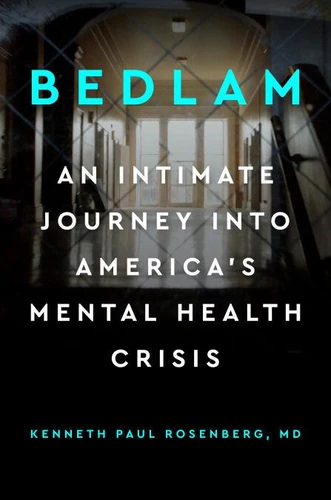Bedlam. An Intimate Journey Into America's Mental Health Crisis
Par :Formats :
Disponible dans votre compte client Decitre ou Furet du Nord dès validation de votre commande. Le format ePub protégé est :
- Compatible avec une lecture sur My Vivlio (smartphone, tablette, ordinateur)
- Compatible avec une lecture sur liseuses Vivlio
- Pour les liseuses autres que Vivlio, vous devez utiliser le logiciel Adobe Digital Edition. Non compatible avec la lecture sur les liseuses Kindle, Remarkable et Sony
- Non compatible avec un achat hors France métropolitaine
 , qui est-ce ?
, qui est-ce ?Notre partenaire de plateforme de lecture numérique où vous retrouverez l'ensemble de vos ebooks gratuitement
Pour en savoir plus sur nos ebooks, consultez notre aide en ligne ici
- Nombre de pages256
- FormatePub
- ISBN978-0-525-54132-5
- EAN9780525541325
- Date de parution01/10/2019
- Protection num.Adobe DRM
- Taille2 Mo
- Infos supplémentairesepub
- ÉditeurAvery
Résumé
A psychiatrist and award-winning documentarian sheds light on the mental-health-care crisis in the United States. When Dr. Kenneth Rosenberg trained as a psychiatrist in the late 1980s, the state mental hospitals, which had reached peak occupancy in the 1950s, were being closed at an alarming rate, with many patients having nowhere to go. There has never been a more important time for this conversation, as one in five adults--40 million Americans--experiences mental illness each year.
Today, the largest mental institution in the United States is the Los Angeles County Jail, and the last refuge for many of the 20, 000 mentally ill people living on the streets of Los Angeles is L. A. County Hospital. There, Dr. Rosenberg begins his chronicle of what it means to be mentally ill in America today, integrating his own moving story of how the system failed his sister, Merle, who had schizophrenia.
As he says, "I have come to see that my family's tragedy, my family's shame, is America's great secret."Dr. Rosenberg gives readers an inside look at the historical, political, and economic forces that have resulted in the greatest social crisis of the twenty-first century. The culmination of a seven-year inquiry, Bedlam is not only a rallying cry for change, but also a guidebook for how we move forward with care and compassion, with resources that have never before been compiled, including legal advice, practical solutions for parents and loved ones, help finding community support, and information on therapeutic options.
Today, the largest mental institution in the United States is the Los Angeles County Jail, and the last refuge for many of the 20, 000 mentally ill people living on the streets of Los Angeles is L. A. County Hospital. There, Dr. Rosenberg begins his chronicle of what it means to be mentally ill in America today, integrating his own moving story of how the system failed his sister, Merle, who had schizophrenia.
As he says, "I have come to see that my family's tragedy, my family's shame, is America's great secret."Dr. Rosenberg gives readers an inside look at the historical, political, and economic forces that have resulted in the greatest social crisis of the twenty-first century. The culmination of a seven-year inquiry, Bedlam is not only a rallying cry for change, but also a guidebook for how we move forward with care and compassion, with resources that have never before been compiled, including legal advice, practical solutions for parents and loved ones, help finding community support, and information on therapeutic options.
A psychiatrist and award-winning documentarian sheds light on the mental-health-care crisis in the United States. When Dr. Kenneth Rosenberg trained as a psychiatrist in the late 1980s, the state mental hospitals, which had reached peak occupancy in the 1950s, were being closed at an alarming rate, with many patients having nowhere to go. There has never been a more important time for this conversation, as one in five adults--40 million Americans--experiences mental illness each year.
Today, the largest mental institution in the United States is the Los Angeles County Jail, and the last refuge for many of the 20, 000 mentally ill people living on the streets of Los Angeles is L. A. County Hospital. There, Dr. Rosenberg begins his chronicle of what it means to be mentally ill in America today, integrating his own moving story of how the system failed his sister, Merle, who had schizophrenia.
As he says, "I have come to see that my family's tragedy, my family's shame, is America's great secret."Dr. Rosenberg gives readers an inside look at the historical, political, and economic forces that have resulted in the greatest social crisis of the twenty-first century. The culmination of a seven-year inquiry, Bedlam is not only a rallying cry for change, but also a guidebook for how we move forward with care and compassion, with resources that have never before been compiled, including legal advice, practical solutions for parents and loved ones, help finding community support, and information on therapeutic options.
Today, the largest mental institution in the United States is the Los Angeles County Jail, and the last refuge for many of the 20, 000 mentally ill people living on the streets of Los Angeles is L. A. County Hospital. There, Dr. Rosenberg begins his chronicle of what it means to be mentally ill in America today, integrating his own moving story of how the system failed his sister, Merle, who had schizophrenia.
As he says, "I have come to see that my family's tragedy, my family's shame, is America's great secret."Dr. Rosenberg gives readers an inside look at the historical, political, and economic forces that have resulted in the greatest social crisis of the twenty-first century. The culmination of a seven-year inquiry, Bedlam is not only a rallying cry for change, but also a guidebook for how we move forward with care and compassion, with resources that have never before been compiled, including legal advice, practical solutions for parents and loved ones, help finding community support, and information on therapeutic options.



